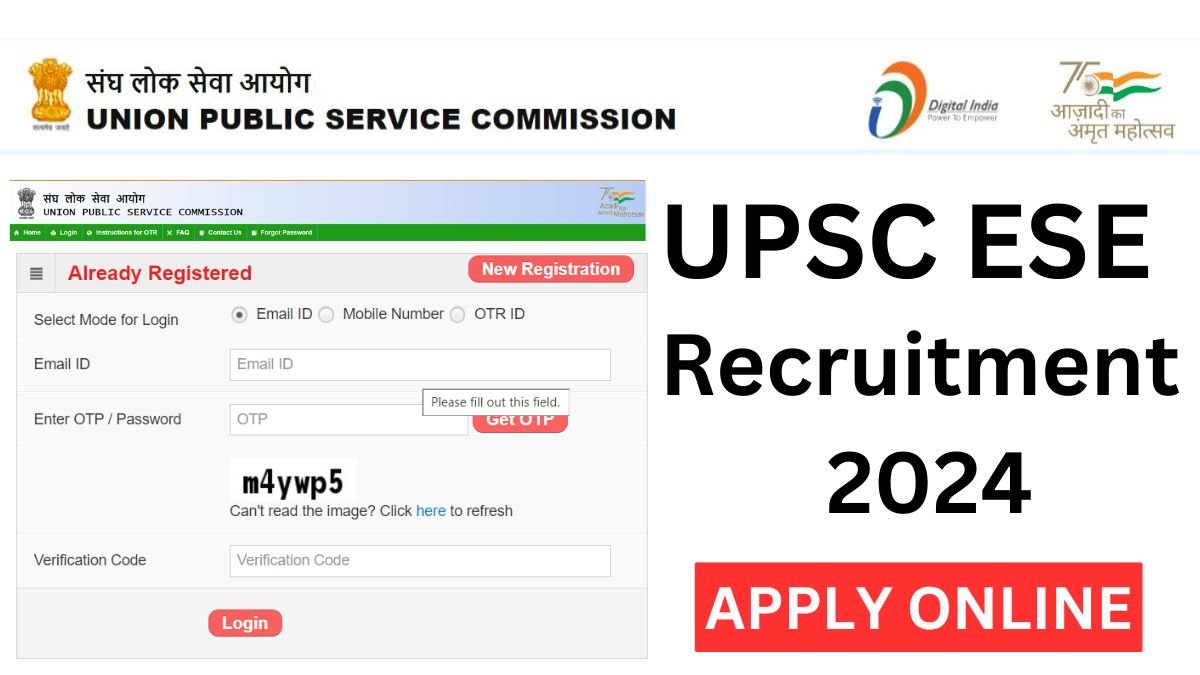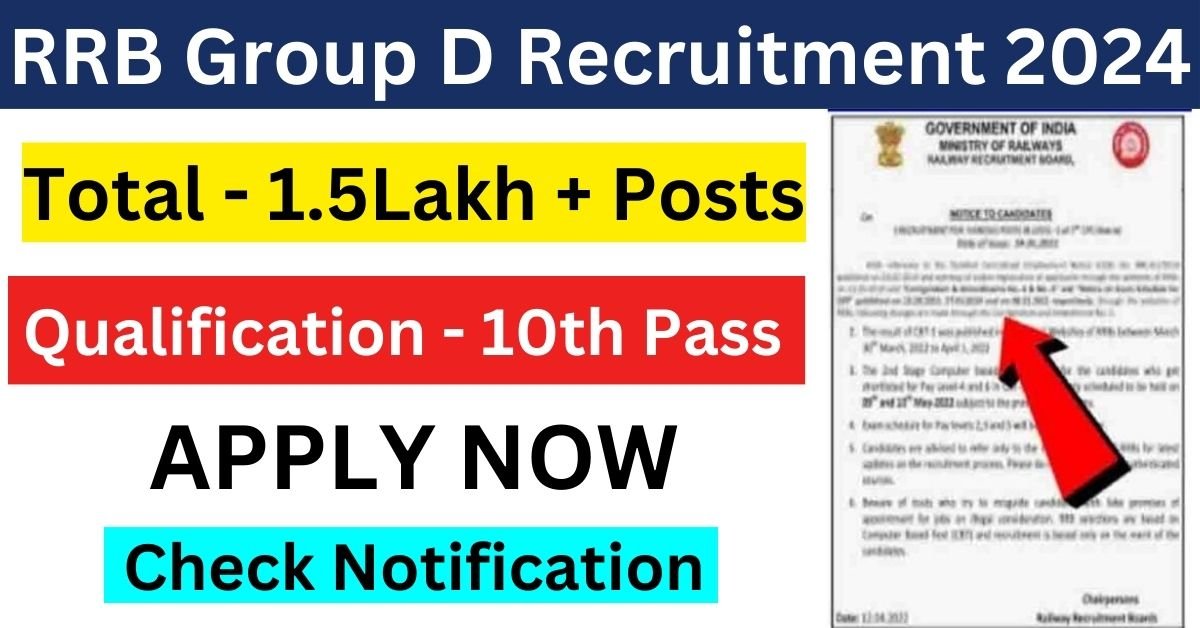UPSC ESE Recruitment 2025 : The Union Public Service Commission (UPSC) Engineering Services Examination (ESE) 2025 has released job vacancies on various posts of Civil, Mechanical, Electrical & Electronics Telecommunication Engineering, to apply for this post, the apply link is given below, through which you can easily apply, vacancies have been released on the various posts, the vacancies are available for 232 Posts.
Through this post, take advantage of a lot of information, Age Limit Criteria, Notification Information, Salary Selection Process, Education Qualification, etc. You will get all the information through this post.
UPSC ESE Recruitment 2025 Important Information
Organization Name – Union Public Service Commission (UPSC)
Total Number of Vacancies – 232
Employment Type – Central Govt. Job
Job Location – All Over India
Post Name -: Civil, Mechanical, Electrical & Electronics Telecommunication Engineering. Posts
Official Website -: www.upsc.gov.in
Applying Mode -: Online
Educational Qualification
Check according to post wise – candidates must have a degree in Engineering/Technology (B.E./B.Tech) or equivalent qualification in subjects like Civil, Mechanical, Electrical, Electronics, and Telecommunication from a recognized Government Institution or University.
Minimum Educational Qualifications
For admission to the examination, a candidate must have –
- Obtained a degree in Engineering from a university incorporated by an act of the central or state legislature in India or other educational institutions established by an act of Parliament or declared to be deemed as universities under section-3 of the University Grants Commission act, 1956 or
- Passed Section A and B of the Institution Examinations of the Institution of Engineers (India) or
- Obtained a degree/diploma in Engineering from foreign University/College/Institution and under such conditions as may be recognised by the Government for the purpose from time to time or
- Passed Graduate Membership Examination of the Institute of Electronics and Telecommunication Engineers (India) or
- Passed Associate Membership Examination Parts II and III/Sections A and B of the Aeronautical Society of India or
- Passed Graduate Membership Examination of the Institution of Electronics and Radio Engineers, London held after November 1959
Provided that a candidate for the post of Indian Naval Armament Service (Electronics Engineering Posts) and Indian Radio Regulatory Service Group ‘A’ may possess any of the above qualifications or the qualification mentioned below namely:
- For Indian Naval Armament Service (Electronics Engg. Posts) – M.Sc. degree or its equivalent with Wireless Communication Electronics, Radio Physics or Radio Engineering as a special subject.
- For Indian Radio Regulatory Service – M.Sc. degree or its equivalent with Wireless Communication Electronics, Radio Physics or Radio Engineering as a subject or Master’s Degree in Science with Physics and Radio Communication or Electronics or Telecommunication as a special subject.
Job Location
Pan India
Selection Process
- Prelims Exam
- Mains Exam
- Personality Test.
Application Fees
You will have to deposit some amount at the time of filling the application form
UR/OBC/EWS Candidates – Rs. 200/-
SC/ ST/PWD/Women/Others Candidates – Nil
Salary Structure
As per rule – INR 55,135
Salary Structure After ESE
Basic salary of Rs. 56,100/- per month and net salary of around Rs. 85,000/- per month. (As per 7th Pay Commission).
| Level | Pay Scale | Time Frame |
|---|---|---|
| Junior Time Scale (JTS) | INR 56100-177500 | On Joining |
| Senior Time Scale (STS) | INR 67700-208700 | 3-5 years |
| Junior Administrative Grade (JAG) | INR 123100-215900 | 10-15 years |
| Senior Administrative Grade (SAG) | INR 144200-218200 | 15-20 years |
| Higher Administrative Grade (HAG) | INR 182200-224100 | |
| HAG+ | INR 205400-224400 | |
| Apex Scale | INR 225000 |
Allowences
- Residential Quarters or HRA, depending on whether the officer uses the allocated quarters or arranges for his or her own lodging.
- Allowance for Dearness
- As an extra incentive, Travel Allowance/ Tour Allowance is provided.
- Official Vehicle, used for official purposes such as visiting locations or attending meetings, etc.
- Medical Assistant
- Domestic Helpers and Drivers
Important Documents Check Here.
- Photo and Signature (Light color background photo)
- Domicile Certificate
- Caste Certificate
- Employment Certificate
- PAN Card and Aadhar Card (ID Proof)
- Education Certificate (8th Pass & 10th Other)
How to Apply
Mode – Online
You can use the online medium to apply for this post.
To apply, first go to the official website. http://www.upsc.gov.in/
At the top you will see a button of UPSC ESE Posts Recruitment 2025. Notification which has to be clicked
An application form will appear in front of you from which you have to fill your personal details and register
After filling the form, pay the application fee through online mode and click on the submit button.
Take a print out of the failed application form which will be useful for future use.
In this way you can easily fill up the form.
Age Limits
- Minimum Age Limit – 21 years
- Maximum Age Limit – 30 years
Important Date
| Notification Release | 18th September 2024 |
| Last Date to Submit the Form | 8th October 2024 |
| Modification in Application Form | 9th October 2024 to 15th October 2024 |
| Preliminary Exam Date | 9th February 2025 |
Vacancy Details
| Posts | Vacancy |
| Civil Engineering Mechanical Engineering Electrical Engineering Electronics & Telecommunications Engineering | 232 |
UPSC IES Civil Engineering Posts
Group-A Services/Posts
(i) Central Engineering Service (Roads), Group-A (Civil Engineering Posts).
(ii) AEE (Civil) in Border Roads Engineering Service.
(iii) Survey of India Group ‘A’ Service.
(iii) Indian Defence Service of Engineers.
(iv) AEE (QS&C) in MES Surveyor Cadre.
(v) Central Water Engineering (Group ‘A’) Service.
(vi) Indian Skill Development Service.
UPSC IES Mechanical Engineering Posts
Group-A/B Services/Posts
(i) AEE in GSI Engineering Service Gr ‘A’.
(ii) Indian Defence Service of Engineers.
(iii) Indian Naval Armament Service (Mechanical Engineering Posts).
(iv) Central Water Engineering (Group ‘A’) Service.
(v) Defence Aeronautical Quality Assurance Service/SSO-II (Mechanical).
(vi) Indian Skill Development Service.
UPSC IES Electrical Engineering Posts
Group-A/B Services/Posts
(i) Indian Defence Service of Engineers.
(ii) Central Power Engineering Service Gr ‘A’ (Electrical Engineering Posts).
(iii) Indian Naval Armament Service (Electrical Engineering Posts)
(iv) Defence Aeronautical Quality Assurance Service/SSO-II (Electrical).
(v) Central Power Engineering Service Gr ‘B’ (Electrical Engineering Posts).
UPSC IES Electronics and Telecommunication Engineering Posts
Group-A/B Services/Posts
(i) Indian Radio Regulatory Service Gr ‘A’
(ii) Indian Telecommunication Service Gr ‘A’.
(iii) Indian Naval Armament Service (Electronics and Telecom Engineering Posts).
(iv) Indian Naval Material Management Service (Electronics and Telecom Engineering Posts)
(v) Defence Aeronautical Quality Assurance Service/SSO-II (Electronics & Tele).
(vi) Junior Telecom Officer Gr ‘B’.
UPSC ESE 2025 Exam Pattern
Stage 1 – Preliminary Exam
| Papers | Subject | Marks | Duration | Negative Marking |
| Paper 1 | General Studies and Engineering Aptitude Paper | 200 Marks | 2 Hours | 1/3 of Negative Marking |
| Paper 2 | Engineering Discipline – Specific Paper | 300 Marks | 3 Hours | 1/3 of Negative Marking |
| Total | 500 Marks | 5 Hours |
Stage 2 – Mains Exam
| Papers | Subject | Marks | Duration | Negative Marking |
| Paper 3 | Engineering Discipline – Specific Paper 1 | 300 Marks | 3 Hours | No Negative Marking |
| Paper 4 | Engineering Discipline – Specific Paper 2 | 300 Marks | 3 Hours | No Negative Marking |
| Total | 600 Marks | 6 Hours |
Stage-III: Personality Test
| STAGE-III | MARKS |
|---|---|
| Personality Test | 200 |
| STAGE-I+ STAGE-II+STAGE III | 1300 |
ESE 2025 Syllabus
Stage I – Paper I, Objective type, Common to all Candidates, duration 2 hours, Maximum Marks 200.
- Current issues of national and international importance relating to social, economic and industrial development
- Engineering Aptitude covering Logical reasoning and Analytical ability
- Engineering Mathematics and Numerical Analysis
- General Principles of Design, Drawing, Importance of Safety
- Standards and Quality practices in production, construction, maintenance and services
- Basics of Energy and Environment : Conservation, Environmental pollution and degradation, Climate change, Environmental impact assessment
- Basics of Project Management
- Basics of Material Science and Engineering
- Information and Communication Technologies (ICT) based tools and their applications in Engineering such as networking, e-governance and technology based education.
- Ethics and values in engineering profession
Branch/Discipline: Civil Engineering
(Contents for syllabi of both the Papers together for Stage-I objective type Paper–II and separately for Stage-II Conventional type Paper-I and Paper – II)
PAPER – I
1. Building Materials:
Stone, Lime, Glass, Plastics, Steel, FRP, Ceramics, Aluminum, Fly Ash, Basic Admixtures, Timber, Bricks and Aggregates: Classification, properties and selection criteria;Cement: Types, Composition, Properties, Uses, Specifications and various Tests; Lime & Cement Mortars and Concrete: Properties and various Tests; Design of Concrete Mixes: Proportioning of aggregates and methods of mix design.
2. Solid Mechanics:
Elastic constants, Stress, plane stress, Strains, plane strain, Mohr’s circle of stress and strain, Elastic theories of failure, Principal Stresses, Bending, Shear and Torsion.
3. Structural Analysis:
Basics of strength of materials, Types of stresses and strains, Bending moments and shear force, concept of bending and shear stresses; Analysis of determinate and indeterminate structures; Trusses, beams, plane frames; Rolling loads, Influence Lines, Unit load method & other methods; Free and Forced vibrations of single degree and multi degree freedom system; Suspended Cables; Concepts and use of Computer Aided Design.
4. Design of Steel Structures:
Principles of Working Stress methods, Design of tension and compression members, Design of beams and beam column connections, built-up sections, Girders, Industrial roofs, Principles of Ultimate load design.
5. Design of Concrete and Masonry structures:
Limit state design for bending, shear, axial compression and combined forces; Design of beams, Slabs, Lintels, Foundations, Retaining walls, Tanks, Staircases; Principles of prestressed concrete design including materials and methods; Earthquake resistant design of structures; Design of Masonry Structure.
6. Construction Practice, Planning and Management:
Construction – Planning, Equipment, Site investigation and Management including Estimation with latest project management tools and network analysis for different Types of works; Analysis of Rates of various types of works; Tendering Process and Contract Management, Quality Control, Productivity, Operation Cost; Land acquisition; Labour safety and welfare.
PAPER – II
1. Flow of Fluids, Hydraulic Machines and Hydro Power:
- Fluid Mechanics, Open Channel Flow, Pipe Flow: Fluid properties; Dimensional Analysis and Modeling; Fluid dynamics including flow kinematics and measurements; Flow net; Viscosity, Boundary layer and control, Drag, Lift, Principles in open channel flow, Flow controls. Hydraulic jump; Surges; Pipe networks.
- Hydraulic Machines and Hydro power – Various pumps, Air vessels, Hydraulic turbines – types, classifications & performance parameters; Power house – classification and layout, storage, pondage, control of supply.
2. Hydrology and Water Resources Engineering:
Hydrological cycle, Ground water hydrology, Well hydrology and related data analysis; Streams and their gauging; River morphology; Flood, drought and their management; Capacity of Reservoirs. Water Resources Engineering : Multipurpose uses of Water, River basins and their potential; Irrigation systems, water demand assessment; Resources – storages and their yields; Water logging, canal and drainage design, Gravity dams, falls, weirs, Energy dissipaters, barrage Distribution works, Cross drainage works and head-works and their design; Concepts in canal design, construction & maintenance; River training, measurement and analysis of rainfall.
3. Environmental Engineering:
- Water Supply Engineering: Sources, Estimation, quality standards and testing of water and their treatment; Rural, Institutional and industrial water supply; Physical, chemical and biological characteristics and sources of water, Pollutants in water and its effects, Estimation of water demand; Drinking water Standards, Water Treatment Plants, Water distribution networks.
- Waste Water Engineering: Planning & design of domestic waste water, sewage collection and disposal; Plumbing Systems. Components and layout of sewerage system; Planning & design of Domestic Waste-water disposal system; Sludge management including treatment, disposal and re-use of treated effluents; Industrial waste waters and Effluent Treatment Plants including institutional and industrial sewage management.
- Solid Waste Management: Sources & classification of solid wastes along with planning & design of its management system; Disposal system, Beneficial aspects of wastes and Utilization by Civil Engineers.
- Air, Noise pollution and Ecology: Concepts & general methodology.
4. Geo-technical Engineering and Foundation Engineering :
- Geo-technical Engineering : Soil exploration – planning & methods, Properties of soil, classification, various tests and inter-relationships; Permeability & Seepage, Compressibility, consolidation and Shearing resistance, Earth pressure theories and stress distribution in soil; Properties and uses of geo-synthetics.
- Foundation Engineering: Types of foundations & selection criteria, bearing capacity, settlement analysis, design and testing of shallow & deep foundations; Slope stability analysis, Earthen embankments, Dams and Earth retaining structures: types, analysis and design, Principles of ground modifications.
5. Surveying and Geology:
- Surveying: Classification of surveys, various methodologies, instruments & analysis of measurement of distances, elevation and directions; Field astronomy, Global Positioning System; Map preparation; Photogrammetry; Remote sensing concepts; Survey Layout for culverts, canals, bridges, road/railway alignment and buildings, Setting out of Curves.
- Geology : Basic knowledge of Engineering geology & its application in projects.
6. Transportation Engineering:
Highways – Planning & construction methodology, Alignment and geometric design; Traffic Surveys and Controls; Principles of Flexible and Rigid pavements design. Tunneling – Alignment, methods of construction, disposal of muck, drainage, lighting and ventilation. Railways Systems – Terminology, Planning, designs and maintenance practices; track modernization. Harbours – Terminology, layouts and planning. Airports – Layout, planning & design.
UNION PUBLIC SERVICE COMMISSION, NEW DELHI
ENGINEERING SERVICES EXAMINATION (ESE) SYLLABus
Important Link
Notification Link – Click Here
Apply Link – Click Here
Official Website – Click Here
YouTube Link – Click Here
NOTE – इस पोस्ट पर दी गई सारी जानकारी अन्य न्यूज़ वेबसाइट एवं जॉब के ऑफिशियल वेबसाइट से ली गई है।हमारी वेबसाइट www.rojgargyaan.com पर किसी भी प्रकार का कोई भी जॉब नहीं दिया जाता है। जॉब प्राप्त करने के लिए आपको ऑफिशियल वेबसाइट पर जाकर अप्लाई करना होगा और सारी प्रक्रियाओं को पूरा करना होगा यहां आपको केवल जॉब से रिलेटेड जानकारियां दी जाती हैं.




